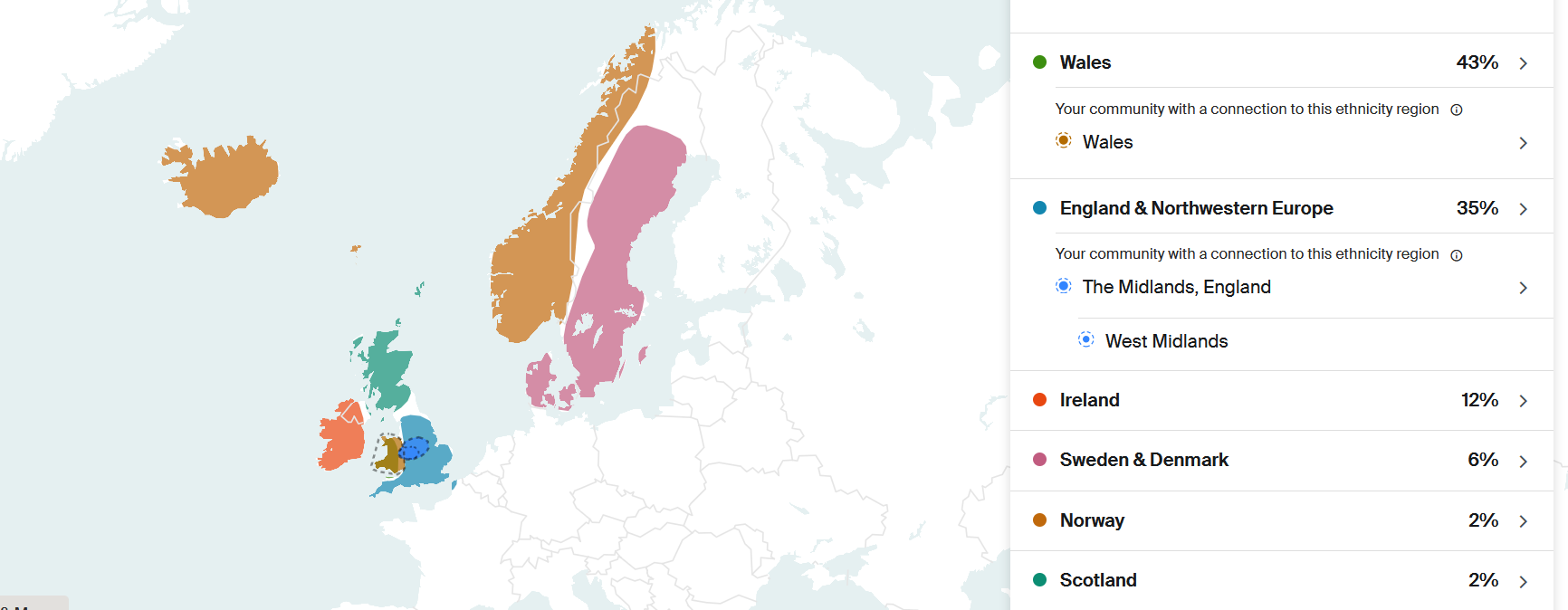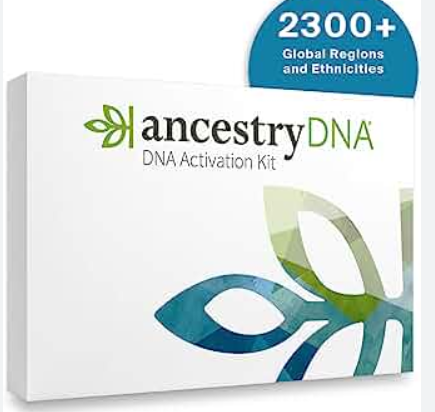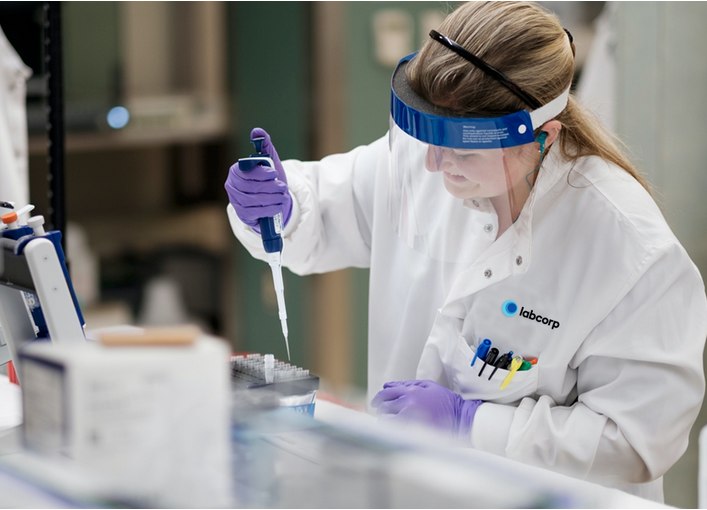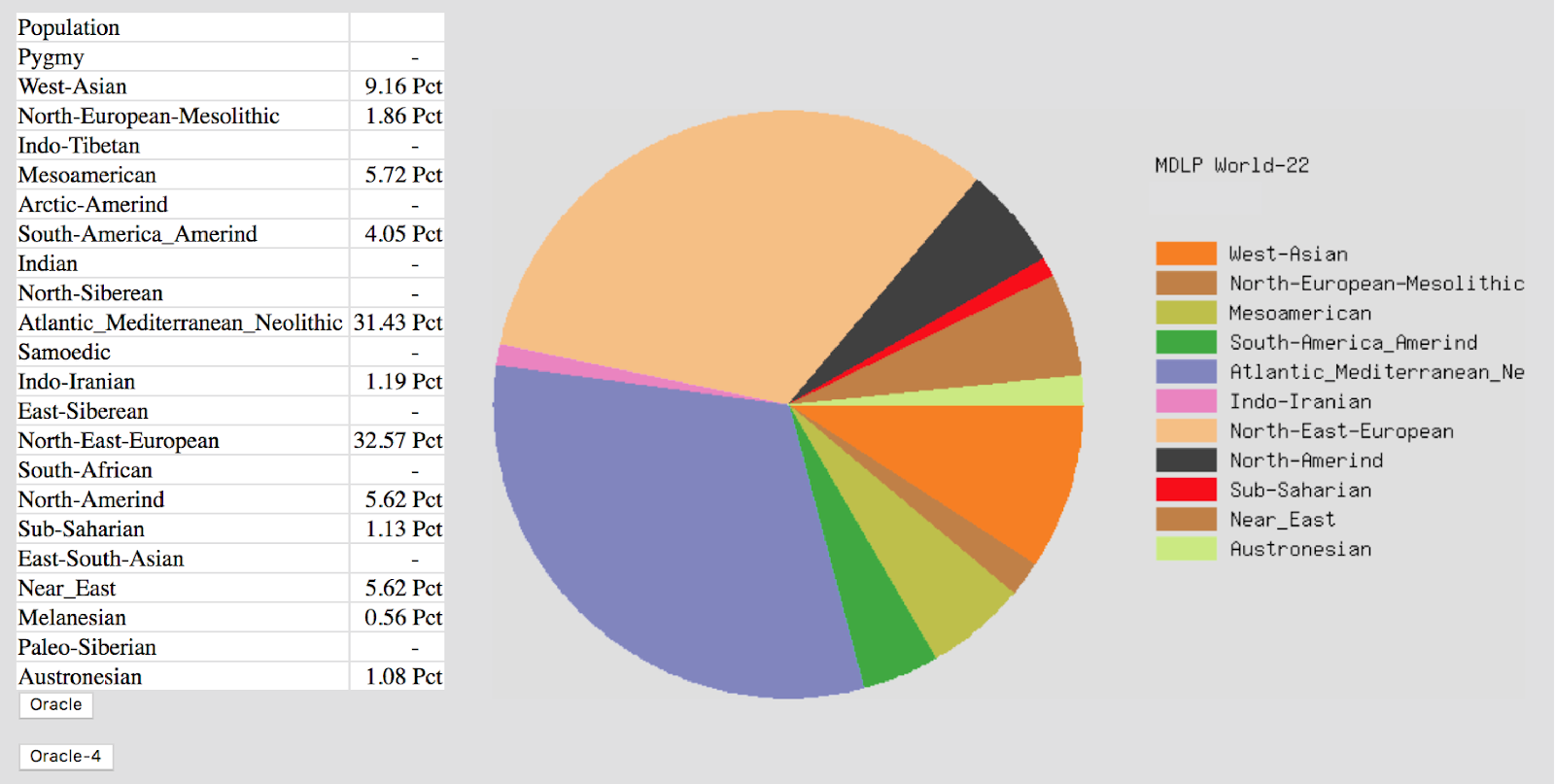Ethnicity Estimate: Where to Get Free Estimates
How Is Our Ethnicity Inherited?
In order to understand how these tests work it is probably best to start off with just how our ethnicity is inherited. Well just like any aspect of our DNA the genes that hold the secret to where our ancestors came from are passed down through the generations.
We receive about 50% of our DNA from each of our parents who themselves got 50% from each of theirs. This means that in a perfect world we should have received 25% of our DNA from each of our four grandparents.
DNA recombination is not perfect, however, and it can be very random. Beyond the parent/child relationship DNA inheritance starts to waver. Below is a table that shows how much DNA we might receive from our ancestors if DNA inheritance was perfect.
So how does this relate to our ethnicity estimate? Well, among the DNA that we inherit there are segments that are commonly found in the populations of specific regions. The more segments we have in common with the populations of a region, the higher the likelihood that we have ancestors from that place.
As an example, if one of our great-great-great-grandparents was of African heritage we could potentially share 3.12% of their DNA, more or less. In that DNA could be segments that are commonly found in Africa.
What Is an Ethnicity Estimate?
Ethnicity estimates which are sometimes known as ancestry composition reports are the most popular reason for consumer DNA testing. It is only one aspect of the test but for most people, it is the main reason they buy.

It is a breakdown report that provides a reasonably accurate approximation of a person's most recent global ancestry. Using a complex algorithm and the results from millions of DNA tests around the world, sites like AncestryDNA create an estimate of where your ancestors were living several generations ago.
Sites like AncestryDNA map out your DNA and look for segments that are common to the population of specific regions. The more segments you have that match a certain area the higher the percentage chance that you had a recent ancestor from that area.
Ethnicity Estimates Can Change
I wish I had taken screenshots or recorded all of the different updates of my own Ethnicity estimate because today I can’t remember the exact values. I do know, however, that the estimate I have today isn’t technically that different from my first results but it is much more accurate.
As I recall, on my first estimate I was considered 95% British, a small amount of Scandinavian and very oddly 1% Native American. That last one really didn’t seem to make much sense for a guy who was born and raised in Shropshire, England.
Almost every year AncestryDNA performs an update of their systems adding new regions by splitting up larger ones thanks to a better understanding of the DNA. Very quickly that 1% Native American result disappeared so this was seemingly an error that was rectified with better understanding.
As of September 2023 my makeup has been refined quite extensively and contains these ethnicities:
43% Wales
35% England & Northwestern Europe
12% Ireland
6% Sweden & Denmark
2% Scotland
2% Norway
Having extensively researched my family tree I can attest to the accuracy of at least 78% of this DNA. As far as I can tell, my family comes from just three counties in the UK, one in Wales and two in England, all of which border one another.
The Scottish DNA I can’t quite locate but it is likely that at some point in the distant past I have ancestors from this region. Also, the Scandinavian DNA is not surprising considering the massive presence of Vikings in England between 793 – 1066 AD. I undoubtedly have some distant Viking ancestry.
Why Exactly Do Our Estimates Change?

The first thing we have to remember when it comes to our ethnicity DNA tests is the term estimate. This is not an exact science even if the results seem to match perfectly at times with your own genealogical research.

At the testing lab, our DNA is compared to millions of other samples in search of segments of DNA that are found most notably in certain geographic regions. If we have large or numerous sections that are found in specific regions the company's algorithms calculate this as a percentage.
The higher the percentage we are given in the estimate the more likely we are to have had a recent ancestor with deep genetic connections to that country or region. This is just an estimate of course but with each new update, the accuracy does improve.
As AncestryDNA gathers more and more tests for their database the quality of their base reference samples improve. In terms of my own DNA, Ancestry suggests that I have deep genetic connections to the West Midlands of England. This is where I was born and a lot of my ancestors came from this region as well.
With each successive update to their DNA databases, Ancestry has honed in on my ethnic genetic makeup. Of course, mine is a little vanilla in terms of diversity. Those with a more diverse heritage will also have seen more refined results over time and hopefully will see more the next time AncestryDNA updates.
Why Is It Called an Estimate?
It is important to remember that these sites do refer to their tests as estimates or approximations. As previously mentioned our DNA is not inherited in a perfect way. There may be ancestors in our tree from regions that do not show up in our ethnicity estimate.
We may have been told that our great-great-great-great-grandfather was 100% Native American, but there are no signs of that in the estimate. The truth is that we may not have inherited any DNA from that ancestor but without them, we would not exist.
Therefore it is possible that some of our family history is not reflected in our DNA at all. This is of course not the fault of the test or the testing companies. They can only find what is there after all and if the DNA was not passed down it can’t be found.
With regards to the DNA that is present, how accurate is the estimate? Well, it is important to note that if you and a full sibling both test you can get different results. You share the same parents so you would think your ethnicity would match. In truth, however, your sibling may possess the Native American DNA that is not found in yours.
The random recombination of DNA means that the further we go back in the generations the more inaccurate the percentage will likely be. If one of your parents is 100% Italian then you would be at least 50% Italian. If one of your grandparents was 100% Italian you would assume you would be at least 25%. In fact, your percentages might be lower or higher.
How Do Companies Do This?
The major testing companies such as AncestryDNA and 23andMe have spent years building a database of customers and DNA projects from around the world. Using complex techniques they have been able to profile unique DNA characteristics that are specific to certain regions.

It is against this extensive database that the big companies compare our DNA and use complex search algorithms to get our estimates. Based on how closely we match a certain region's known characteristics they assign a percentage based on that match.
Remember It’s Just for Fun
It is very important that we realize that these ethnicity DNA tests are 100% just for fun. Once we pay our $99 all we get is our ethnicity estimate and a whole bunch of potential DNA family matches. This is of course great and potentially helpful in our family tree building.
The test does not prove anything of great importance, however. It has no value in a paternity suit, it can't be used to determine dual citizenship and it has no value in proving ethnicity for any legal reason. These tests, although improving year by year in their accuracy, will never be 100% accurate because DNA itself is not fully accurate when it comes to our ethnicity.
How Much Do Genealogy Based DNA Tests Cost?
There are a range of DNA testing companies that offer various different products with some testing specific types of DNA. In the table below I will list the top companies, what they offer and the current price as of June 2022.
It should be noted that these are the full prices for each product but these sites will often have seasonal discount deals.
There are a wide range of tests available; some test different types of DNA, for example FamilyTreeDNA who now offer autosomal DNA tests like the others but have offered Y-DNA and mitochondrial DNA for a long time.
Can You Get a Free Ethnicity Estimate?
So now we come to the big question: where can you get a free ethnicity estimate? Well to be clear ethnicity estimates require a DNA test and realistically speaking you are unlikely to find a free version anywhere.

This is because DNA testing can be an expensive endeavor and the big testing companies can only keep prices as low as they do by sheer volume of testing. Essentially then the initial DNA test that creates the ethnicity estimate will have to be paid for.
There is always a possibility that a family member interested in genealogy may ask you to take a test to help their research and often this means they would buy the test. You could also always request a test for a birthday or Christmas present as I myself did.
Once you have taken a test with AncestryDNA you can download your raw DNA data and use it in several other sites to get additional ethnicity estimates which may be slightly different from the one you get from Ancestry. Sites like GEDmatch and MyHeritage allow you to upload your DNA for free from Ancestry to receive their version of ethnicity estimation.
Final Thoughts
Unless you are gifted or asked by a family member to take a genealogy DNA test you are not likely to receive a free ethnicity estimate. Even when you can upload your raw DNA data to another site the initial test will have been paid for. Generally speaking though DNA testing is not that expensive especially if you are just going for the basic versions for an ethnicity estimate.
Link To or Reference This Page
We spent a lot of time downloading, cleaning, merging, and formatting the data that is shown on the site.
If you found the data or information on this page useful in your research, please use the tool below to properly cite or reference Name Census as the source. We appreciate your support!
-
<a href="https://namecensus.com/blog/ethnicity-estimate-where-to-get-free-estimates/">Ethnicity Estimate: Where to Get Free Estimates</a>
-
"Ethnicity Estimate: Where to Get Free Estimates". NameCensus.com. Accessed on April 27, 2024. https://namecensus.com/blog/ethnicity-estimate-where-to-get-free-estimates/.
-
"Ethnicity Estimate: Where to Get Free Estimates". NameCensus.com, https://namecensus.com/blog/ethnicity-estimate-where-to-get-free-estimates/. Accessed 27 April, 2024
-
Ethnicity Estimate: Where to Get Free Estimates. NameCensus.com. Retrieved from https://namecensus.com/blog/ethnicity-estimate-where-to-get-free-estimates/.
